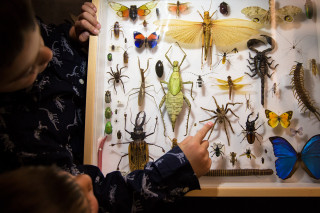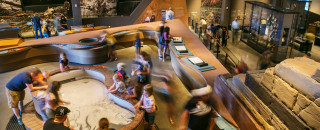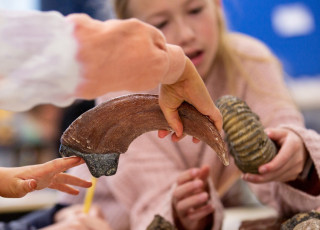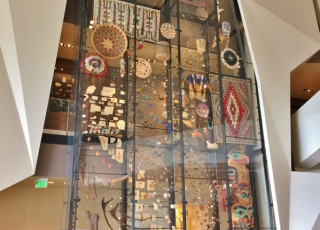The Museum Effect: How Visiting Museums May Improve Mental Health in Children
May is Mental Health Awareness Month and NHMU is collaborating with the Children's Center of Utah to share the benefits children experience when getting out and exploring places like the museum.
By Cloe Butler
We have all witnessed the wonder that children experience when entering a museum. Their eyes widen with interest and excitement as they see dinosaurs, plants, artifacts, and other wonders before them. But could children also experience lasting mental health benefits from museum visits?
Research suggests that visiting museums might have mental health benefits such as reducing anxiety and depression and providing children with lasting mindfulness skills.
According to Jerrica Pitzen, a Family Therapist at The Children’s Center Utah, “Fostering a child’s mental health is just as important as ensuring their physical health needs are met.” And fortunately, a museum visit can positively contribute to both.
From day one, children form connections and learn about themselves and the world around them. At museums, like the Natural History Museum of Utah, children get a chance to explore science, nature, and art, energizing both the mind and body.
Museums and Anxiety Relief

Photo by Mark Johnston/NHMU
Visiting museums has been found to reduce anxiety in children and adults. Studies show that cortisol levels, which are hormones produced in response to stress, decrease after a single museum visit, and regular visits can lead to even better cortisol responses. Walking through museums has been linked to lower overall levels of stress and anxiety.
Additionally, “developing relationships is an important skill for children to learn. There are many ways that we can help children learn to create friendships”, according to Veronica Love, Staff Psychologist at The Children’s Center Utah. Children’s programs at museums can help foster these important friendships through comradery and shared interests.
Enjoyable and memorable outings to a museum can also foster stronger bonds within a child's immediate family. Strengthening relationships with family members also improves lifelong well-being and may reduce the risk of developing psychiatric conditions such as anxiety or depression.
Museums and Learning
In addition to the mental health benefits, museum visits and programs can provide alternative learning modes for children. Children are constantly learning from their surroundings, and providing spaces for nontraditional learning can broaden their capacity to digest information.
Tim Lee, Director of Exhibits at the Natural History Museum of Utah, explains that “when planning began for the new Natural History Museum of Utah the museum imagined a novel approach to its exhibits. It imagined a diversity of experiences for different learning types of all ages. Immersive environments, hands-on interactives, live animal displays, videos, scent stations, and soundscapes compliment and activate more traditional object-based displays.” Parents of children with cognitive disabilities may find these interactive models, sensory exhibits, and inclusive programs beneficial for their child’s individual learning style.

©NHMU/Brian Twede
The Natural History Museum of Utah is also committed to creating a museum experience accessible to families of all abilities. Tactile tours, sign language interpreters, ramps, elevators, and sensory-friendly environments all ensure that everyone can have a comfortable and meaningful experience during their visit.
Additionally, Tracey Collins, Director of Education and Community Engagement, tells us that “The Natural History Museum of Utah has partnered with local organizations that serve individuals with disabilities, including the National Federation of the Blind of Utah, Utah Schools for the Deaf and the Blind, and Camp Kostopulos. By prioritizing inclusivity, museums can become welcoming spaces that reflect and respect the diversity of their communities, allowing all visitors to engage deeply with exhibits and educational programs.”
About The Children’s Center Utah
May is Mental Health Awareness Month, a time for individuals and organizations to fight stigma around mental health. In Utah, 60% of children facing mental, emotional, developmental, or behavioral challenges are left without the treatment they urgently need. The Children’s Center of Utah, a nonprofit located in West Valley City, provides comprehensive mental health care to enhance the emotional well-being of infants, toddlers, preschoolers, and their families. If you and your child need help, please visit childrenscenterutah.org.
The Children’s Center Utah team includes clinical mental health counselors, clinical social workers, licensed marriage and family therapists, psychologists, and an on-site child and adolescent psychiatrist. The Children’s Center Utah can help families and caregivers find creative and affordable ways to manage mental health, such as visiting museums.
You can learn more about The Children’s Center Utah at:
Instagram: @childrenscenterutah
Facebook: The Children’s Center Utah
References
Katherine N. Cotter & James O. Pawelski (2022) Art museums as institutions for human flourishing, The Journal of Positive Psychology, 17:2, 288-302, DOI: 10.1080/17439760.2021.2016911
Šveb Dragija M, Jelinčić DA. Can Museums Help Visitors Thrive? Review of Studies on Psychological Wellbeing in Museums. Behav Sci (Basel). 2022 Nov 17;12(11):458. doi: 10.3390/bs12110458. PMID: 36421754; PMCID: PMC9687250.



